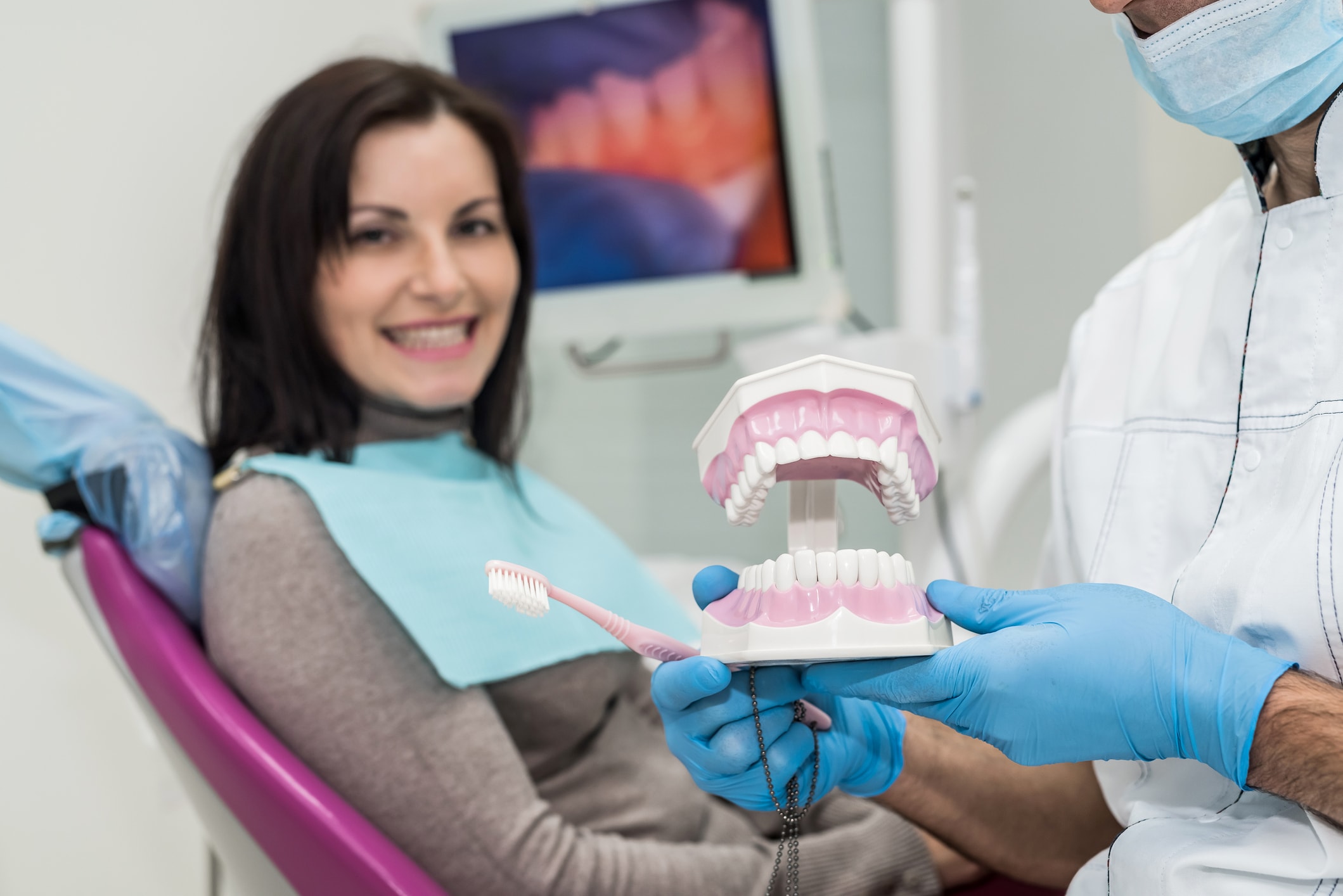
How to Treat Gum Disease: Surgery, Antibiotics, Antimicrobials
Do you bleed a little when you brush your teeth, or is there any blood stuck to your gums during a floss? Gum bleeding might be a sign that you are currently suffering from gingivitis or gum disease.
In the early stage of gum disease, or sometimes called periodontal disease, bacteria in plaque can build up and inflame the gums. As a result, the gums are irritated, become more tender, and can easily bleed.
When left untreated, however, the bacterial infection can travel through your gum line and reach your jaw bone, causing a more serious form of periodontal disease called periodontitis or gum infections.
Both gingivitis and periodontitis are not only affecting your oral health, from tooth loss to bad breath, but also can raise risks to diseases like heart conditions, diabetes, pneumonia, and even cancer.
Read more: Markham dentists that are now accepting new patients
Treatment Options for Gum Disease
Above, we have discussed how early treatment for gum disease is very important.
During the early stage of gingivitis, the tooth is still firmly planted, and there is no permanent bone or tissue damages at this stage. In short, the condition is mostly reversible.
On the other hand, periodontitis can cause irreversible, permanent bone damages and tooth loss. Early treatment so that gingivitis doesn’t develop into periodontitis is very important.
There are plenty of treatment options for gum disease, both surgical and non-surgical. The treatment of choice might depend on the stage of the disease, your overall health, allergies, and how you responded to earlier treatments.
Read more: Sleep dentistry or sedation dentistry is it right for you
Non-Surgical Gum Disease Treatment Options
Here are possible treatments for gum disease that don’t involve a surgical procedure:
- Professional cleaning
One of the major causes of gum disease is plaque buildup. Regular brushing and flossing won’t cover all the areas inside your mouth, for example, areas between your teeth and behind your gum line. This is where professional dental cleaning is necessary.
During a regular visit to the dentist, the dental specialist will remove plaque and tartar (the hardened plaque that is accumulated on the tooth surface) from the surface of the teeth and below the gumline. Also, we can only remove tartar with a professional dental cleaning.
It is worth noting that dental cleaning alone won’t be effective to treat gum disease when it is already ‘active’, for example when the gum line has significantly receded. It is, however, an important procedure to prevent gum disease and also to slow down its progress.
- Deep cleaning: dental scaling and root planing
Deep cleaning is the most common non-surgical treatment to treat active gum disease and is mainly performed when your dentist determines that you have plaque and tartar under the gums, that need to be cleaned. Deep cleaning nowadays can be performed with two types of cleaning instruments:
- Hand-held instruments: the dental specialist will use a thin tool called dental scaler and curette to manually ‘scale’ the plaque from the surface of your teeth, and also below the gum line and on your tooth’s root surface (root planing).
- Ultrasonic instruments: these modern instruments clean plaque and tartar from the teeth’s surface and under the gums with a vibrating metal tip that ‘peels’ off the tartar, and can also spray water to rinse the plaque-tartar away while keeping the tip cool.
During the deep cleaning process, the dentist will apply local anesthetics to numb the gum and tooth’s root, so you will only feel slight pressure and discomfort during the scaling and root planing processes.
The deep cleaning process can effectively remove bacteria and provide a smooth, clean surface for the gums to reattach the teeth.
Read more: The best 4 reasons to see your dentist immediately
Drugs To Treat Gum Disease: Antibiotics and Antimicrobials
Antibiotic and antimicrobial treatment might be used as a non-surgical treatment for gum disease, either as a standalone treatment or in combination with professional cleaning procedure as discussed above.
Drug treatment might also be used in combination with surgery, as well as other therapies, and the main purpose of this treatment is to eliminate temporarily (and possibly, permanently) the bacteria that is associated with gum disease, while at the same time suppressing the destruction of the bone and gum-tooth attachment due to bacterial infections.
- Doxycycline, minocycline (Aerestin), and tetracycline are common antibiotics used to treat gum disease
- For antimicrobial, Chlorhexidine is the main choice and is commonly marketed as PerioChip, PerioGard, and other brands.
These medications can come in the form of a gelatin-filled chip that is placed in the gums’ pockets after scaling and root planing, often for as long as a week. They might also be able as a mouth rinse or usual oral medication (tablets).
Some kinds of toothpaste might also offer antibacterial features by including triclosan (an antibiotic) and fluoride.
Surgical Gum Disease Treatment Options
If the gum disease is determined as severe or has developed into periodontitis or other complications, surgical treatments might be applied, such as:
- Bone Graft
This procedure is performed when gum infections have destroyed a significant portion of the jawbone, and so bone reconstruction is necessary.
Bone grafts involve using fragments of a healthy bone to replace the damaged bone and promoting healthy regeneration of the jawbone. The ‘graft’ can used a portion of your healthy bone, donated bone, and even manufactured, artificial/synthetic bone.
The bone graft mainly serves as a new foundation or platform to regrow the bone, mainly to maintain stability for the teeth and promote reattachment. Also, newer tissue engineering technologies can encourage bone and tissue regeneration at a much faster rate than ever before.
- Tissue Graft
This procedure involves grafting thin tissue, that is stitched in place, in areas where gums have receded due to infections. The grafted tissue is usually taken from the roof of the mouth.
- Guided Tissue Regeneration
A fairly new procedure involving new medical technology, applied when the jawbone supporting the tooth’s root has been completely destroyed by bacterial infections.
This procedure is mainly implemented to stimulate bone and gum tissue to regrow. Performed by performing a flap surgery to open the gums, and insert a mesh-like fabric between the gum tissue and bone. This material directs (or ‘guides’) the gum tissue to grow to the desired area. When the bone is severely destroyed, gum tissue tends to grow into the area where the bone should be, complicating the damage. This way, the bone, and surrounding tissue can regrow properly to support the tooth.
- Pocket Reduction Surgery
In this surgical procedure, the gums are lifted back to expose the pocket. This is why the procedure is also often called ‘Flap surgery’. The opened, ‘flapped’ gums provide the dentist with more access to remove plaque and tartar from the periodontal pockets created by the gum disease.
Depending on the case, the damaged bone’s surface might be smoothed during the process. The gums are then placed so the gum tissue can fit perfectly to surround the tooth, reducing the pocket between the tooth and gum, and effectively decreasing the area where harmful bacteria can grow and limit areas where disease-causing bacteria can grow, effectively decreasing the risks of bacterial infections.
- Bone Surgery
Performed in a combination with flap surgery. Flap surgery is performed to open the gums, and the bone around the tooth is reshaped and re-smoothed to eliminate the damaged areas and craters that are created due to bone loss. These damaged areas can be a place where bacterias collect and grow, further causing infections.
End Words
In most cases, your dental or periodontal specialist can perform most of the treatment procedures discussed above—including surgical ones— in their office. Different procedures might require different time required to perform it, and the time of recovery will also vary between different procedures and from patient to patient.
In general, however, local anesthesia will be implemented when required, so you won’t feel any pain during the treatment, just pressure and slight discomfort.
Contact dentists at Markham Smile Centre if you suspect yourself of suffering from gum diseases, our team of professional dentists will help determine the best course of actions to treat your disease according to your needs and financial comfort.

See what our patients are saying:
Everyone here is very friendly and provides excellent care. I received a full exam on my first visit, and everyone took time to answer my questions and ensured I felt comfortable the entire time - exactly what you want when visiting the dentist. I highly recommend Markham Smile Centre for anyone looking for great dental care.
There is an ample parking space before you get into the office. The receptionists welcome us friendly with proper COVID-19 procedures in place. The staff worked with patient very patiently and professionally. My teeth cleaning was done by Ying, she explained every detail to me and I did not feel any pain or uncomfortable at all. Thanks to the best team !
It's been a while since I've been to a dentist but I'm trying to get back on track with health in general. Overall it was great going to Markham Smile Centre! The receptionist (I believe she was Kim) was friendly. The hygienist, Ying, was attentive and gentle during the cleaning; x-ray tech (forgot her name, sorry!) was great too. Dr. Sara Riad explained things with good detail. Looking forward to going back!
I was someone who was nervous and anxious about visiting the dentist, but the team at Markham Smile Centre has made me feel SO comfortable. Kim is so patient and helpful and Dr. Hwang and Rory are both so professional and wonderful. They thoroughly explain the procedure to make you comfortable beforehand and are very gentle. I now look forward to visiting the dentist!
I found this place on a whim when I was looking for a new dentist in Markham. My hygienist ying was super nice and her cleaning was very gentle yet thorough. I saw Dr.Jason and he was very nice and informative in regards to what needs to be done and provided me with all the information I needed to make a choice. Would recommend this place to anyone looking for a new dentist, they’re accepting new patients!!
I have been to many dentists in my life, Dr. Jason is easily the best dentist I have ever been too. He does everything he can to make you comfortable no matter the procedure and is a true professional, as does all the staff at Markham Smile Centre. Truly an amazing dentistry
The clinic was clean and the staff was very polite. I particularly liked the fact that everything was explained to me before going in for the procedure so I knew what to expect at each step. The dental hygienist who did the cleaning for me was also very gentle and took my concerns into consideration. I will definitely recommend them.
Upon arriving to the Markham Smile Centre, my son and I were greeted with a warm welcome by the receptionists. The hygienists and Dentist were very gentle and transparent with what they were doing. The hygienist that worked on my 9 year old son was patient and very friendly with him, which helped ease his nerves. Our overall experience was A+.
Since I was little, I have always hated going to the dentist... Its always uncomfortable and unpleasant. These days, visiting the dentist isn’t so bad! Dr Jason, Rory, and the lovely staff at reception make the experience 100x better. I have had absolutely no issues with the gum graft and cleanings that I’ve gotten done here. Everyone is incredibly friendly and helpful, even when I’m calling in or emailing a hundred questions :). I would highly recommend Markham Smile Centre.
Love this place! All the staffs are friendly and Professional and I mean all, cause I've been to most of their office, Markham , Stouffville, North York, and Maple. Dr. Ko is very professional and patient. Whenever I have questions and concerns he would always reply me . I would say this this dental office take care of you all the way. I would highly recommend everyone to come here for any dental works. =)

